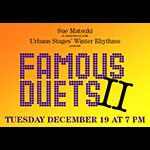Bruno Giraldi
Love or Death?
Don’t Tell Mama, NYC, August 23, 2025
Reviewed by Bart Greenberg

There are sentimental cabaret shows. There are contemporary cabaret shows. There are cabaret shows that pay tribute to a composer, a lyricist, a performer, or even a specific year. And there are cabaret shows that are just plain weird. Not that that’s a bad thing. Bruno Giraldi’s Love or Death? definitely falls into the weird category. As a meditation on the two subjects in the title, the program interwove the writings of Freud, Plato, Nietzsche, and Marx (among many others) with a varied list of popular songs. That the tone of the show was often anti-romantic and downright cynical certainly made it as different as possible from the average cabaret show, and Giraldi made it all feel intensely personal.
With the support of music director/pianist John Bowen and stage director Christopher Tramantana, Giraldi was an explosive presence. He used every inch of the space, from lying on the floor to perching on the piano. He shifted from upstage to down and even did some Fosse-like chair choreography while delivering “Bring on the Men” (Frank Wildorn/Leslie Bricusse). Somehow, all this action never distracted from the theme of the show. Bowen’s almost constant melodic accompaniment and his lengthy pre-show overture helped to keep things moving along.
Some of the show’s musical highlights included a truly passionate and tender “The Rose” (Amanda McBroom); a hysterical “My Heart Will Go On” (Will Jennings/James Horner), which had a 1950s doo-wop treatment; and a drenched-in-barely-controlled passion “Dulcinea” (Joe Darion/Mitch Leigh). (The subsequent “The Impossible Dream” pushed Giraldi’s limited range beyond its effective zone.) Another flaw was that he should have slowed down while speaking. The complex philosophies he was trying to share often became difficult to absorb at the speed in which he delivered them. Far more exciting were a hot and dark version of “Cabaret” (John Kander/Fred Ebb), sung in Spanish but fully comprehensible, and “Trouble” (Jerry Lieber/Mike Stoller), which had a dollop of Eartha Kitt in the growl. Giraldi is an exciting personality who definitely connected with his audience, and he has a strong way with a lyric; he just needed to slow down a bit and concentrate on delivering his message a bit more clearly.
Key words





